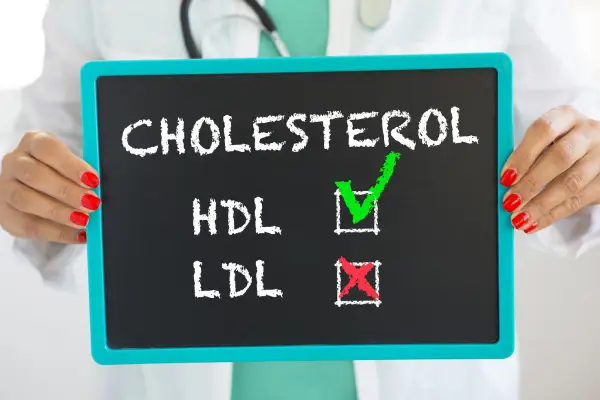4 Reasons You Should Stop Fearing Cholesterol-Rich Foods Today!
Ever find yourself staring at a delicious plate of scrambled eggs or a juicy steak, only to hear that nagging voice saying, “Watch out for that cholesterol!”? Trust me, you’re not alone. Cholesterol has been the bad boy of the nutrition world for years, but is it really as evil as it’s made out to be?
Spoiler alert: It’s not. 🚨
Today, we will bust some myths and drop some truth bombs about cholesterol. We’ll dig into why this misunderstood molecule is crucial for your body and why you shouldn’t give those cholesterol-rich foods the side-eye. So, buckle up because we’re about to change how you look at your diet!
The Basics of Cholesterol: What’s the Deal?
Alright, let’s get down to nuts and bolts. What the heck is cholesterol, anyway? Picture this: a waxy, fatty substance cruising through your bloodstream. And guess what? You actually need this guy. That’s right, cholesterol isn’t just some random intruder; it’s more like a VIP guest at the party that is your body.
The Good and the Bad: LDL vs. HDL
You’ve probably heard these acronyms thrown around like confetti at a New Year’s Eve party: LDL and HDL. But what do they mean?
LDL (Low-Density Lipoprotein): This one’s often tagged as the “bad” cholesterol. But here’s the thing—it’s not entirely bad. Too much LDL can lead to plaque buildup in your arteries, which isn’t exactly a party for your heart.
HDL (High-Density Lipoprotein): Now, this is the good stuff. HDL is like the bouncer at the club, escorting excess LDL out of your bloodstream and back to the liver, where it’s broken down. Higher HDL levels can be a good sign for your heart health.
So, the next time someone starts talking about “good” and “bad” cholesterol, you can school them with some facts. It’s all about balance!
Why Cholesterol is Essential: More Than Just a Number
So, we’ve established that cholesterol isn’t the villain it’s often portrayed as. But let’s dig deeper—why is cholesterol crucial for our well-being?
The Building Blocks of Life
First off, cholesterol is a fundamental building block for your cell walls. Imagine building a house without bricks; it just wouldn’t work. Similarly, your cells rely on cholesterol for their structure and function.
The Hormone Connection
Here’s another eye-opener: cholesterol plays a starring role in hormone production. We’re talking about essential hormones like testosterone and estrogen. Without adequate cholesterol, your body would struggle to produce these key players, affecting everything from your mood to your metabolic rate.
It’s Mostly Homegrown
And get this—most of the cholesterol in your body is produced by your liver. Your body is its own cholesterol factory, meaning only a small portion comes from your food. So, blaming that egg yolk for your cholesterol levels? Think again.
In essence, cholesterol is far from being a mere bystander in your body; it’s an active participant in maintaining your health. So, it’s high time we give it the credit it deserves.
The Myths Surrounding Cholesterol: Time for a Reality Check
Let’s tackle the elephant in the room: the myths and misconceptions that have given cholesterol its bad rap. You’ve probably heard some of these before, and it’s time to set the record straight.
Myth 1: Cholesterol-Rich Foods Are Your Enemy
Let’s debunk this one right off the bat. Eating cholesterol-rich foods like eggs or shellfish doesn’t automatically skyrocket your cholesterol levels. Your body is more intelligent than that. It adjusts its own cholesterol production based on what you consume. So, go ahead and enjoy that omelette!
Myth 2: High Cholesterol is a Death Sentence
Another common misconception is that high cholesterol is a one-way ticket to Heart Attack City. While it’s true that elevated cholesterol levels can be a risk factor for heart disease, it’s just one piece of the puzzle. Lifestyle factors like exercise, stress, and overall diet play a significant role.
Myth 3: All Fats Raise Cholesterol
Many people lump all fats together, thinking they all raise your cholesterol. Not true. Trans fats and saturated fats can increase LDL levels. Still, healthy fats like those in olive oil and avocados can improve your cholesterol profile.
Myth 4: Only Older Adults Need to Worry About Cholesterol
Think cholesterol is just an “old person’s problem”? Think again. Even younger adults can have elevated cholesterol levels, especially with the prevalence of processed foods and sedentary lifestyles. It’s never too early to start paying attention to your cholesterol.
By dispelling these myths, we can view cholesterol as what it truly is: a vital component of our health that deserves understanding, not fear.
The Risks of High Cholesterol: A Balanced View
While we’ve been singing the praises of cholesterol, it’s important to note that, like anything in life, too much of a good thing can be problematic. Let’s discuss the risks associated with high cholesterol levels.
The Cardiovascular Connection
Elevated levels of LDL cholesterol can lead to plaque buildup in your arteries. Over time, this can narrow the arteries and limit blood flow, increasing the risk of heart disease and stroke. It’s a serious concern but can often be managed with lifestyle changes.
The Blood Pressure Factor
High cholesterol levels can also be linked to high blood pressure. When your arteries narrow, your heart has to work harder to pump blood, which can elevate your blood pressure. Again, this is a modifiable risk factor that lifestyle changes can positively impact.
The Diabetes Dilemma
You might not know that high cholesterol levels can also be associated with a higher risk of developing type 2 diabetes. While the relationship between the two is complex, it’s another reason to monitor your cholesterol levels.
The Importance of Regular Check-Ups
The best way to know where you stand is to get regular check-ups. Monitoring your cholesterol levels can provide valuable insights into cardiovascular health and help you make informed decisions.
While high cholesterol levels pose risks, it’s crucial to understand that they are often manageable. With the right lifestyle choices and medical guidance, you can take control of your cholesterol and, by extension, your overall health.
Foods You Shouldn’t Fear: The Unsung Heroes of Nutrition
So, we’ve tackled the myths and looked at the risks. Now, let’s get to the fun part: the foods you can enjoy without that nagging guilt about cholesterol.
Eggs: Nature’s Multivitamin
Eggs have been demonized for years due to their cholesterol content. Still, they’re packed with essential nutrients like protein, vitamins, and minerals. Plus, they’re incredibly versatile—scrambled, poached, or boiled, the choice is yours!
Fatty Fish: Your Omega-3 Fix
Salmon, mackerel, and sardines are not just delicious; they’re also rich in omega-3 fatty acids, improving your cholesterol profile and supporting heart health.
Lean Meats: Protein Without the Guilt
Lean cuts of meat like chicken and turkey provide high-quality protein without the saturated fats that can raise your LDL levels. Just remember, moderation is key.
Dairy: More Than Just Calcium
Full-fat dairy products like yoghurt and cheese do contain cholesterol. Still, they also offer other essential nutrients like calcium and protein. Opt for organic or grass-fed varieties when possible.
Nuts and Seeds: Snack Smart
Almonds, walnuts, and flaxseeds are cholesterol-free and offer healthy fats, fibre, and protein. They’re the perfect snack to keep you fueled throughout the day.
The bottom line? You don’t have to eliminate cholesterol-rich foods from your diet; you just need to choose wisely. By focusing on nutrient-dense options, you can enjoy a diverse, balanced diet without cholesterol worries.
How to Maintain Balanced Cholesterol Levels: Your Action Plan
So, you’re armed with the facts and ready to take control of your cholesterol. What’s next? Here’s your straightforward, no-nonsense action plan:
Eat a Balanced Diet
Your diet plays a pivotal role in managing cholesterol. Aim for a balanced plate with plenty of fruits, vegetables, and whole grains. These foods are nutrient-rich and contain fibre, which can help regulate cholesterol levels.
Get Moving
Physical activity is a crucial player in cholesterol management. Aim for at least 150 minutes of moderate exercise per week. Consistent exercise can improve your cholesterol profile, whether cardio, weightlifting, or even a brisk walk.
Manage Stress
While I’m not about to recommend a meditation retreat, it’s worth noting that chronic stress can impact your health, including cholesterol levels. Simple stress management techniques like taking short breaks, engaging in physical activity, or even talking issues out can be effective.
Regular Check-Ups
Don’t underestimate the power of regular medical check-ups. Routine cholesterol screenings give you the data you need to make informed decisions about your health.
Consult a Doctor
Finding that lifestyle changes aren’t enough to manage your cholesterol levels? It may be time to consult your doctor or GP for further evaluation and possible medication.
I get my cholesterol and other bloodwork checked privately through Medichecks. The comprehensive reports they provide are written by doctors and offer valuable insights into making healthy lifestyle choices. It’s an excellent resource for anyone looking to take a proactive approach to their health.
Time to Rethink Cholesterol
So there you have it, folks! We’ve journeyed through the cholesterol world, debunking myths, highlighting the foods you can enjoy, and laying out a practical action plan. The key takeaway? Cholesterol isn’t the enemy; it’s a vital component of your health that deserves a balanced approach, not fear.
A Note on My 90-Day Program
Before we wrap up, I’d like to mention my 90-day program, which delves into the importance of portion sizes, especially regarding healthy fats. Understanding portion control is crucial for managing your cholesterol levels and overall health. If you want to take a comprehensive wellness approach, this program offers actionable steps and insights.
References
-
Stone, Neil J., et al. “2013 ACC/AHA Guideline on the Treatment of Blood Cholesterol to Reduce Atherosclerotic Cardiovascular Risk in Adults.” Journal of the American College of Cardiology 63.25 (2014): 2889-2934.
-
Fernandez, Maria L., and Maria Luz Fernandez. “Dietary cholesterol provided by eggs and plasma lipoproteins in healthy populations.” Current Opinion in Clinical Nutrition & Metabolic Care 9.1 (2006): 8-12.
-
Siri-Tarino, Patty W., et al. “Meta-analysis of prospective cohort studies evaluating the association of saturated fat with cardiovascular disease.” The American Journal of Clinical Nutrition 91.3 (2010): 535-546.
-
Schwingshackl, Lukas, and Georg Hoffmann. “Monounsaturated fatty acids, olive oil and health status: a systematic review and meta-analysis of cohort studies.” Lipids in Health and Disease 13.1 (2014): 154.
-
Piepoli, Massimo F., et al. “2016 European Guidelines on cardiovascular disease prevention in clinical practice.” European Heart Journal 37.29 (2016): 2315-2381.
-
National Institute for Health and Care Excellence. “Cardiovascular disease: risk assessment and reduction, including lipid modification.” Clinical guideline [CG181] (2014).
-
Krauss, Ronald M., et al. “Lipoprotein classification, metabolism, and role in atherosclerosis.” UpToDate 14 (2005).
-
Mensink, Ronald P., et al. “Effects of dietary fatty acids and carbohydrates on the ratio of serum total to HDL cholesterol and on serum lipids and apolipoproteins: a meta-analysis of 60 controlled trials.” The American Journal of Clinical Nutrition 77.5 (2003): 1146-1155.
-
American Heart Association. “Lifestyle Changes for High Cholesterol.” Circulation 134.15 (2016): e386-e387.
-
NHS. “High cholesterol – Diagnosis.” NHS Choices, NHS, 2019.
Disclaimer: This blog post is intended for informational purposes only and does not constitute medical advice. While I am a certified Nutritionist, Personal Trainer, and Spartan SGX Coach, I am not a healthcare professional. The information provided in this post is based on my personal experiences, professional expertise, and available research. It should not be used as a substitute for professional medical advice, diagnosis, or treatment. Always seek the advice of your healthcare provider with any questions you may have regarding a medical condition or treatment and before undertaking a new health care regimen. Never disregard professional medical advice or delay in seeking it because of something you have read on this blog.
EDE FITNESS
Fitness and Nutrtition Coaching, Lightwater Surrey
Rob Ede, specialises in providing comprehensive fitness and nutrition coaching tailored to individual needs. Based at Lightwater Leisure Centre in Surrey, Ede Fitness is dedicated to helping clients achieve their health and fitness goals through personalised programs.
Address
Lightwater Leisure Centre, Lightwater GU18 5RG
Phone
07782 390729


